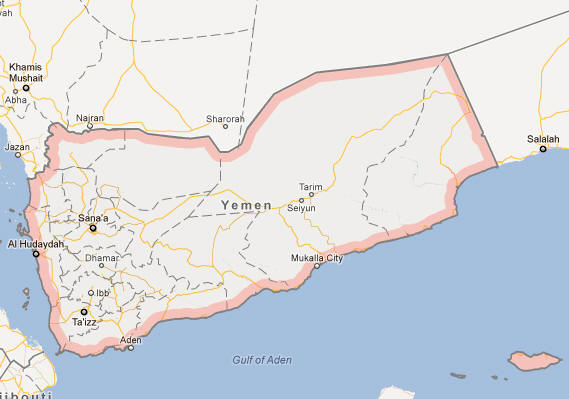The Future of America’s Foreign Policy in Yemen
By Kevin Bishop
U.S. government praised the recent election of Abd Rabbuh Mansur Hadi to the presidency of Yemen, and saw it as promising for democratic reform in Yemen’s future. President Obama claimed that “Yemen has the potential to serve as a model for how peaceful transitions can occur.” However, the belief that the unopposed election of Hadi, former president Ali Abdullah Saleh’s personal pick for the presidency, could lead to meaningful change is naïve of Yemeni politics.
The election of a new president will mean nothing if the United States allows the status quo to persist in Yemen. If the U.S. government is serious in its dedication to democratic reform and regional security, it must rethink its Yemen policy at this juncture.
Saleh and his policies remain strong forces in Yemen despite his formal departure, with his relatives controlling various government and military apparatuses. With Hadi now in control of the Yemeni government, the United States must decide how to best achieve its security goals in Yemen, mainly defeating al-Qaeda in the Arabian Peninsula (AQAP), while still fostering a gradual shift towards democratic change.
Despite the poor human rights record of the Yemeni regime, it is important that the U.S. avoid directly supporting any of the numerous opposition groups, as the country is already on the verge of becoming a failed state. Lending formal support to an opposition group, particularly the Shi’a Houthis in North Yemen or the Southern Yemen secession movement, could lead to major complications, namely the potential for armed conflict and regional agitation. Change in Yemen must come gradually due to the highly factious nature of its political and social structure.
While it would be beneficial to support the Hadi presidency for the foreseeable future, it is imperative that the United States improves its foreign aid strategy in Yemen. Saleh and his cronies, Hadi included, have long taken advantage of America’s counter-terrorist ambitions by not tackling the threat of AQAP with the utmost conviction. By doing this, the regime has tricked the U.S. into believing that AQAP’s continued presence in Yemen can be explained by a lack of funding. Unfortunately, American money is largely used to augment the regime’s own security forces, which have been involved in quelling peaceful protests for the last year. This trend will likely continue once Hadi takes power unless a serious rethinking of U.S. assistance to Yemen is conducted. While foreign aid to Yemen is necessary for humanitarian reasons, the U.S. should stop funneling money directly to the Yemeni government, which has proven itself to be unreliable in combating AQAP and inept at aiding its own citizens.
AQAP’s presence in the region may appear to be a nuisance to the regime, but it actually puts the government in a position of power with the U.S. While Yemen’s government has cooperated in hunting AQAP operatives in the past, it has a vested interest in the survival of the terrorist group. America’s perceived reliance on Yemen’s government has prompted a significant amount of aid over the years, which has only helped Saleh to put his allies into positions of power throughout the government.
Now, with Saleh finally out of formal power, what strategy should the U.S. pursue now in Yemen? First, it must carefully balance any relationship with the various opposition groups as not to undermine the U.S.’s relationship with the Yemeni government, which would erase the limited cooperation it does offer. While democratic progress is ultimately the solution to many of the problems plaguing Yemen, it is too soon for sweeping changes, and the U.S. must take a cautious and patient approach.
Second, foreign aid to Yemen, as it currently stands, must be reworked. Funneling money to the Yemeni government is not effective, as it has used much of this aid to bolster its own security forces. These forces have been used to quell protests throughout Yemen, which has only exacerbated existing political and social divides.
A more effective foreign aid strategy would focus on supporting the Yemeni citizens instead of the government. Humanitarian aid to all Yemenis would serve two purposes: it would foster good will with the population, and it would be a relatively non-controversial method of supporting all opposition to the Yemeni government equally without making formal overtures.
Lastly, the U.S. should consider opening dialogue with the various opposition groups throughout Yemen. While this may seem like entanglement on the surface, opening dialogue with the opposition groups would not threaten America’s position in Yemen. The U.S. is already a player in domestic Yemeni politics, and opening dialogue with the opposition groups could pressure the Yemeni government to better cooperate with America’s vision for regional security. As long the U.S. opens dialogue with all opposition groups equally, the Hadi government will find it hard to claim the U.S. is supporting attempts to overthrow the regime.
Only through a more humanitarian focused foreign aid campaign, paired with the opening of expansive dialogue, can the U.S. promote democratic progress without destabilizing Yemen. Ultimately, AQAP, which now stands as one of the largest terrorist threats to the U.S., can only be defeated with a cooperative Yemeni government. Even though the current government has not been as helpful in this endeavor as expected, it is too soon to push for democratic change. However, through the use of humanitarian aid, America can still prod Yemen towards democracy without upsetting its delicate political balance. A democratic Yemen would be anathema to AQAP, which thrives on the current domestic instability. Ridding the world of the AQAP threat is possible, but the election of Hadi is far from the solution. Only through soft power can the United States truly change politics in Yemen and improve regional security.
Kevin Bishop is an associate analyst for Arabian Peninsula Affairs at the Institute for Gulf Affairs



Comments are closed.